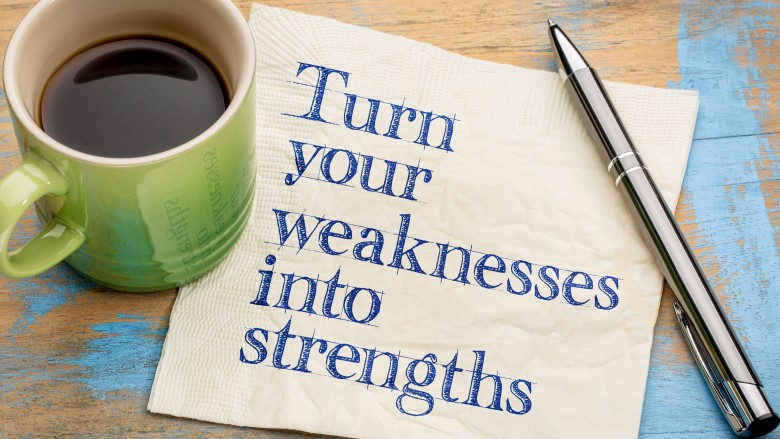The Untold Truth About Self-Confidence
Confidence: you know you want to have it, but are you totally sure what it is — or how to go about getting it?
I have these questions, and I thought you might too. So in addition to conducting my own research, I spoke with one woman who is seriously knowledgeable about the subject. Dr. Kristen Lee is the lead faculty for behavioral science at Northeastern University and a behavioral health clinician "devoted to self-care and resilience." Dr. Lee was kind enough to answer my questions and gave me a lot to think about. I also spoke to Megan Bruneau, a psychotherapist, author, and specialist on perfectionism, and read some of her extensive writing on the subject. These two strong, smart women together had lots of good advice about what self-confidence really is, and how to get there for yourself.
What exactly does confidence mean?
We already know the dictionary definition of the word from back in grade school. We know it's somehow loosely linked to feeling good about yourself. But what exactly do we mean when we say we want to be more self-confident? Confidence, says Dr. Lee, "is characterized by a balanced sense of self," a way of seeing yourself that allows you to appreciate unique strengths, talents, and skills. So if being self-confidant gives us the belief that we will be able to succeed in what we set out to do, perhaps we are more likely to try something risky but rewarding in the first place. For instance, if you believe you would be good at a job you see an advertisement for, you're more likely to apply for it (and maybe get it).
Perfection is a sham
Out of all the good advice I read and received while researching self-confidence, perhaps the most useful and frequently repeated bit was that perfection is a total sham. So if you're looking for realistic, attainable ways to increase your own self-confidence, then not trying to be 'perfect' is a good place to begin. "We all need to realize that we all have strengths and shortcomings," Dr. Lee says, "and that our strongest features are often connected — if we are intense, it can work well for us in some areas, but need refining in other situations."
Waiting to perform a task until you are 100 percent confident you'll succeed is called perfectionism, and its presence can really put a damper on exciting adventures in our lives because we're too afraid of failure to try new things. Instead, Dr. Lee recommends that we "work on embracing both sides of ourselves [the high-achiever and the basket case], and building on our strengths while at the same time developing the needed skills in areas that are not our strong suit."
Confidence isn't all internal
Confidence comes from within, right? Not according to Megan Bruneau MA, RCC. According to her article on the subject for Forbes, the idea that one's sense of self-confidence should come from within is a myth that might actually be perpetuating your feelings of insecurity, anxiety, and self-doubt. Game changer alert!
If you struggle with lack of confidence (and come on, who hasn't at one time or another) then you might be looking at yourself as defective for not being able to cultivate that inner glow of self-possession that supposedly should be rattling around inside your guts. But according to her professional (and personal) experience, "Confidence is ultimately shaped by relationships and experience," says Bruneau. "It's true that the way we relate to ourselves is what determines our levels of anxiety and confidence, but the way we relate to ourselves is largely dependent on our past and current familial, peer, romantic, and work relationships." So while it's true that most therapists will tell you to avoid basing your self-worth on external factors, that doesn't mean you should be able to magically wish yourself into a feeling of self-confidence. That takes experience and positive reinforcement.
Don't confuse confidence with self-esteem
A lack of confidence in oneself can manifest in myriad ways. Feeling anxious? Depressed? Self-conscious? Unloved? Ugh. We all experience these feelings sometimes, but for some of us, these conditions can become pathological illnesses. But one thing therapists (including Bruneau) want to make sure you know: "It's natural to feel under-confident, particularly in unfamiliar situations or performing new tasks." So if you sometimes feel a lack of self-confidence or are unsure about your ability to perform a task well, that is not the same thing as having low self-esteem. In fact, while perpetual low self-esteem should be addressed, having low self-confidence sometimes is normal, and is not necessarily a sign that you have a mental illness or condition.
Confidence is not a steady state
Are you looking to achieve self-confidence as some sort of permanent steady-state that can be achieved and then perpetually hung around in? Sorry. You're searching for a unicorn. Such a thing only exists in myth, our dreams, and imaginations. Sure we'd all love to reach a point in our lives where we say, "That's it! I kick ass and always will," but that's not how real self-confidence works.
According to Bruneau's work for Forbes, "This idea that confidence is a permanent, achievable state is a myth that perpetuates shame and frustration. You are not broken, weak, or under-evolved because you feel anxious and insecure at times. This means you're human and you care, so let go of the idea that you need to (or can!) reach unwavering, eternal confidence and breathe a sigh of relief."
Common attributes of the self-confident
When I looked for an answer to the question about any potential common attributes confident people may share, I wasn't talking about your average platitude statements, like 'they are successful,' 'they are well put-together,' or 'they give a good handshake.' Instead, I wanted to know about real, achievable traits and skills we could cultivate that might help the common woman feel more confident!
Dr. Lee got right to the point, saying, "Building confidence is a process of self-reflection and re-framing negative thoughts about oneself in positive and productive ways." So in other words, it's not the absence of failure, it's the process of remaining resilient through failure. Dr. Lee says that in her experience, most self-confident people have "endured some form of hardship, but are able to take those experiences and see them as motivating factors, and develop a healthy sense of pride and identity around them." They also often admit mistakes, see life as a learning opportunity, and again, are able to avoid the traps of perfectionism.
How can we cultivate these traits?
Once we identify some of these common traits that self-confident people tend to have, what can we do to work on them for our own benefit? Well, we can notice what works for other people, but we should remember to resist the urge to compare ourselves to others, especially in our perennially plugged-in social world.
As Dr. Lee notes, it can be useful to remember that, "Much of what we see in our social media feeds is contrived and airbrushed — most of the time people are only putting their best angles forward, and no one is really as flawless as they are trying to present. Avoiding social media comparisons are essential in today's world where we are flooded with images of perfection." Some comparison is good as an inspiration tool, but there is a limit. According to Dr. Lee, "Confident people [tend to] rely on social comparison to help spur on enough competitiveness to try, but not so much that they never feel good in light of someone else's success or outward appearances."
And as Bruneau says, "True self-confidence is knowing that even if you mess up, you'll be OK. It's having realistic expectations for your performance and giving yourself permission to be an imperfect human being. When we expect perfection, we keep anxiety high and set ourselves up for disappointment. When we give ourselves a little room for inevitable err, we lower anxiety and feel more capable of reaching our realistic expectations (and are able to feel secure in our universally shared imperfection)."
Telling self-confidence from swagger
Here's what self-confidence isn't: it's not swagger, it's not bluster, it's not being braggadocios, it's not making a big show out of one's past successes or perceived ability to succeed in the future. These sorts of people will often avoid talking in detail about an issue, and might instead say not to worry because they'll handle it. If you see this kind of behavior in others, it's up to you whether to believe them, or maybe even feel a little sad for them. When self-confidence is truly present, a person doesn't need to hide her imperfections, because she knows there is no such thing as perfection, and that she can still do incredibly well in life without perfection.
"People with superficial swagger tend to hype themselves up," says Dr Lee, "and have something known as "contingent self esteem," meaning their confidence is only based on a situation — when something goes wrong, they start to crumble. If someone seems too preoccupied by singing their own praises, or creating a picture perfect image, it's often a red flag that they feel insecure."
Choosing to forge ahead
Real self-confidence could be called the state of self-acceptance — the place that leaves room for mistakes, and knows that we're still important and worthy even when we mess up a bit — even, as Dr. Lee puts it, "When things are bumpy and don't go 100 percent right," we can still make forward progress.









